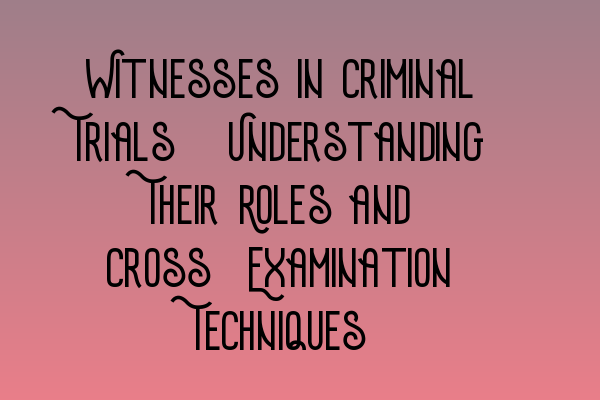Witnesses in Criminal Trials: Understanding Their Roles and Cross-Examination Techniques
Welcome to the SQE Criminal Law & Practice Law UK blog, where we provide valuable insights and resources for aspiring solicitors. In today’s post, we will dive deep into the topic of witnesses in criminal trials, their roles, and cross-examination techniques.
The Role of Witnesses in Criminal Trials
In criminal trials, witnesses play a crucial role in presenting evidence and helping the court reach a just verdict. Witnesses can provide firsthand accounts of the events leading up to and during the alleged crime, offering insight into the circumstances surrounding the case. Their testimonies can significantly impact the outcome of a trial.
Common types of witnesses in criminal trials include:
- Expert Witnesses: These individuals possess specialized knowledge or skills relevant to the case at hand. They provide opinion evidence to assist the court in understanding complex matters.
- Fact Witnesses: Fact witnesses are individuals who have firsthand knowledge of the events in question. They can provide direct evidence based on their personal observations or experiences.
- Character Witnesses: These witnesses testify about the accused’s character traits, which may be relevant in assessing their credibility or propensity to commit the alleged offense.
Cross-Examination Techniques
Cross-examination is a crucial aspect of the trial process, allowing the defense or prosecution to challenge and test the credibility and reliability of the witness’s testimony. It aims to elicit inconsistencies, inaccuracies, biases, or alternative explanations that may weaken the opposing party’s case.
Effective cross-examination techniques include:
- Impeachment: The questioning party may introduce evidence or ask questions to discredit the witness’s credibility, such as prior inconsistent statements or actions.
- Leading Questions: These questions guide the witness towards a desired answer, often used to challenge their version of events or highlight contradictions.
- Refreshing Memory: If a witness appears to have forgotten crucial details, cross-examination may involve presenting them with a document or statement they previously made to refresh their memory.
It is important for solicitors to develop strong cross-examination skills to effectively challenge witnesses, identify weaknesses in testimony, and build a compelling case for their clients.
Related Articles:
We hope this blog post has provided valuable insights into the roles of witnesses in criminal trials and effective cross-examination techniques. Developing these skills as a solicitor is essential in successfully representing your clients’ interests. For further resources and exam preparation, please check out our SQE exam dates, SQE 1 preparation courses, and SQE 2 preparation courses.
